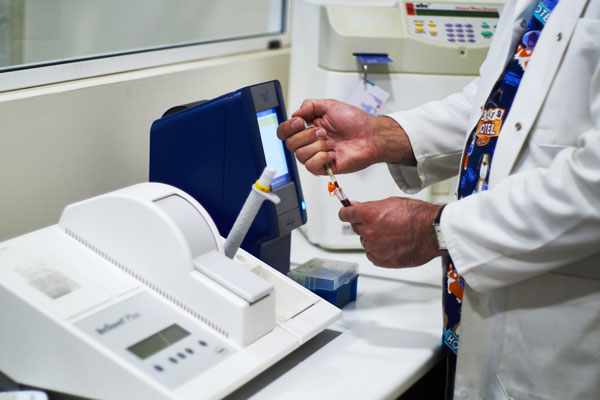Laboratory testing is a critical diagnostic component both for healthy and ill pets. We use blood or other lab tests in certain situations, in order to be able to perform a thorough examination of your animals when needed. Some of these situations are as follows:
- Healthy pets: We use routine preventive blood tests to establish a health profile, which we use as a baseline for future visits. Also, we use them for preanesthetic testing and prior to dental cleaning to decrease the risk of complications, even for young dogs and puppies.
- Pets that show mild signs of an illness: During any health check, if we see signs of an illness and we consider that we need to perform some lab tests, we choose the appropriate laboratory checks that we should perform. With the laboratory support, we aim to diagnose health conditions in their early stages and treat them as quickly and effectively as possible. This can increase the chances of successful treatment and recovery.
- Sick pets: sick pets may need blood tests during their visit to the clinic. However, in certain health problems, sick animals may need blood tests at frequent intervals, depending on their condition and the severity of the problem.
- Pets under medication: To monitor any side effects that medication can have on your pet and to make sure it receives the proper dosage.
- Senior pets: Routine blood tests for a check-up at frequent periods, every year or twice per year, are especially important for your aged dogs and cats, that may be more prone to certain age-related diseases.
Some of the most common laboratory tests we use as diagnostic tools include:
- Complete blood count (CBC) & chemistry panels: help diagnose anemia, parasites, infections, organ function, electrolyte status, hormone and blood sugar levels, and more
- Skin cultures and fungal tests: help detect the presence of allergies and other skin conditions
- Urine analyses: screen for diabetes, urinary tract infections, bladder/kidney stones, as well as dehydration and early kidney disease
- Fecal testing: detects the presence of internal parasites, such as roundworms, hookworms, and tapeworms
- Ehrlichia and Leishmania screening testing
- Feline leukemia (FeLV) and Feline immunodeficiency virus (FIV) screening testing
- T4 (thyroid testing): detects whether the thyroid gland is working properly


